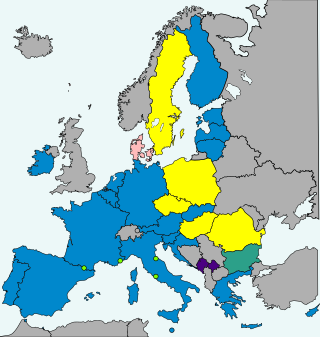| |||||
| Decades: | |||||
|---|---|---|---|---|---|
| See also: | |||||
Events from the year 1998 in the European Union .
| |||||
| Decades: | |||||
|---|---|---|---|---|---|
| See also: | |||||
Events from the year 1998 in the European Union .

The euro is the official currency of 20 of the 27 member states of the European Union (EU). This group of states is known as the eurozone or, officially, the euro area, and includes about 344 million citizens as of 2023. The euro is divided into 100 cents.

The European Commission (EC) is part of the executive of the European Union (EU), together with the European Council. It operates as a cabinet government, with 27 members of the Commission headed by a President. It includes an administrative body of about 32,000 European civil servants. The Commission is divided into departments known as Directorates-General (DGs) that can be likened to departments or ministries each headed by a Director-General who is responsible to a Commissioner.

The Treaty on European Union, commonly known as the Maastricht Treaty, is the foundation treaty of the European Union (EU). Concluded in 1992 between the then-twelve member states of the European Communities, it announced "a new stage in the process of European integration" chiefly in provisions for a shared European citizenship, for the eventual introduction of a single currency, and for common foreign and security policies. Although these were widely seen to presage a "federal Europe", the focus of constitutional debate shifted to the later 2007 Treaty of Lisbon. In the wake of the Eurozone debt crisis unfolding from 2009, the most enduring reference to the Maastricht Treaty has been to the rules of compliance – the "Maastricht criteria" – for the currency union.

The euro area, commonly called eurozone (EZ), is a currency union of 20 member states of the European Union (EU) that have adopted the euro (€) as their primary currency and sole legal tender, and have thus fully implemented EMU policies.

The European System of Central Banks (ESCB) is an institution that comprises the European Central Bank (ECB) and the national central banks (NCBs) of all 27 member states of the European Union (EU). Its objective is to ensure price stability throughout the EU, and improve monetary and financial cooperation between eurozone and non-eurozone member states of the EU.

The institutions of the European Union are the seven principal decision-making bodies of the European Union and the Euratom. They are, as listed in Article 13 of the Treaty on European Union:

The euro came into existence on 1 January 1999, although it had been a goal of the European Union (EU) and its predecessors since the 1960s. After tough negotiations, the Maastricht Treaty entered into force in 1993 with the goal of creating an economic and monetary union by 1999 for all EU states except the UK and Denmark.

Montenegro is a country in South-Eastern Europe, which is neither a member of the European Union (EU) nor the Eurozone; it does not have a formal monetary agreement with the EU either. However, it is one of the two territories that has unilaterally adopted the euro in 2002 as its de facto domestic currency. This means that the euro is not a legal tender there; however, it is treated as such by the government and the population.
Events from the year 2009 in the European Union.
Events in the year 1994 in the European Union.
Events in the year 2010 in the European Union.
Events from the year 1999 in the European Union.

The history of the European Union between 1993 and 2004 was the period between its creation and the 2004 enlargement. The European Union was created at the dawn of the post–Cold War era and saw a series of successive treaties laying the ground for the euro, foreign policy and future enlargement. Three new member states joined the previous twelve in this period and the European Economic Area extended the reach of the EU's markets to three more.
Events from the year 1996 in the European Union.
Events in the year 1995 in the European Union.

The Eurogroup is the recognised collective term for the informal meetings of the finance ministers of the eurozone—those member states of the European Union (EU) which have adopted the euro as their official currency. The group has 20 members. It exercises political control over the currency and related aspects of the EU's monetary union such as the Stability and Growth Pact. The current President of the Eurogroup is Paschal Donohoe, the Minister for Public Expenditure, National Development Plan Delivery and Reform of Ireland.

The international status and usage of the euro has grown since its launch in 1999. When the euro formally replaced 12 currencies on 1 January 2002, it inherited their use in territories such as Montenegro and replaced minor currencies tied to pre-euro currencies, such as in Monaco. Four small states have been given a formal right to use the euro, and to mint their own coins, but all other usage outside the eurozone has been unofficial. With or without an agreement, these countries, unlike those in the eurozone, do not participate in the European Central Bank or the Eurogroup.
Events in the year 2015 in the European Union.
Events in the year 2014 in the European Union.
Events in the year 1993 in the European Union.